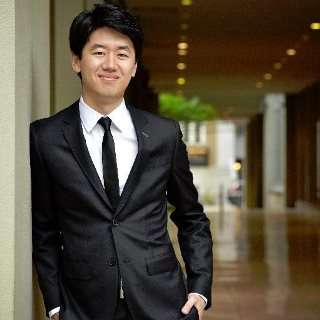|
Back
Kensho Watanabe triumphs Philadelphia
Verizon Hall
04/06/2017 - & April 7, 8*, 9, 2017
Ludwig van Beethoven: The Creatures of Prometheus, Op. 43: Overture and Finale
Mason Bates: Alternative Energy
Wolfgang Amadeus Mozart: Piano Concerto No. 9 in E-flat major, K. 271
Franz Liszt: Prometheus, Symphonic Poem No. 5
Mason Bates (electronica), Daniil Trifonov (piano)
The Philadelphia Orchestra, Yannick Nézet-Séguin/Kensho Watanabe* (conductor)

K. Watanabe (© Philadelphia Orchestra)
The marquee draw at the Philadelphia Orchestra earlier this month reunited 26 year old Russian pianist Daniil Trifonov and Yannick Nezet-Seguin for particularly ambitious program. But Nézet-Séquin was felled by a virus and forced to bow out of the third performance on April 8 and newbie associate conductor Kensho Watanabe filled in with just hours notice.
Watanabe handled it with ease and command, even though he mugged relief at the end, if he was experiencing any nerves he kept them hidden. He was ready for the challenge. After all he was Nézet-Séquin’s conducting student at the Curtis Institute, where he was already viewed as a dynamic maestro, leading Curtis Opera Theater productions and the always muscled Curtis Symphony Orchestra. Philadelphia Orchestra audiences have also been very enthusiastic about Watanab eas conductor of 4th of July concert at Penn’s Landing and on other occasions and he equally impressed, this time conducting for the first time in front of a subscription series concert.
The concert was bookended by two versions of the Greek myth of Prometheus. First Beethoven’s overture and finale from The Creatures of Prometheus. At first sounding a bit studied, but Watanabe igniting the taut, fevered tempo in the back half. And the concert closer was Liszt’s symphonic poem Prometheus, equally fiery with its driving tempos.
Watanabe showed his strongest mettle impressively for Mason Bates’ 2012 futuristic symphony Alternate Energy. Bates’ score is what he terms an “energy symphony of 21 century sounds” that are part of “transformative places” with themes that convey our destructive assault on the planet. From primitive industrial sounds of Henry Ford’s 1896 junkyard in to the sounds of a post-apocalyptic rainforest.
Riccardo Muti conducted the 2012 premiere with the Chicago Symphony Orchestra. Bates is originally from Philadelphia, and makes his Philadelphia Orchestra debut with this piece and is composer in residence at The Kennedy Center. The composer performed with the Philadelphian, positioned in the percussion section at the back of the orchestra to “trigger” his pre-recorded ‘energy installations’ and sound effects from two laptops, as ‘super percussion’ that are fired from different points in the concert hall. What impresses is how the sounds he ‘plays’ are vital to the acoustic symphonic narrative, that is just as startling in its mystical lyricism.
Bates’ narrative soundscape of car cranks, metal timpani clamoring around voluptuous violin passages, leitmotif of American blues fiddling and of Asian classicism (both lead with in sterling lead solos by Principal David Kim.) The textures, contours and elements that appeared and vanished remained fascinating, some even sounding like reverse chart lines. From the farm Bates time-travels to present day Chicago, to a nuclear wasteland in Xinjiang Province 2112 and eventually, post-apocalypse of Reykjavik, Iceland in 2222. With interludes of ominous effects ricocheted around the Hall in hovering jagged fragments and sound sculptures.
Daniil Trifonov’s 2015 Deutsch Grammophon recording of Rachmaninov Variations with YNS and The Philadelphians has been widely praised and it coincided with Trifonov’s international success on stage, hailed for is his technical artistry and interpretive skill playing Rachmaninov, Chopin and Liszt. Trifonov looks almost somber when he walks onstage, with his head down, looking intense, with a beard and long hair. At the piano, hands rested on his legs, completely motionless (and still looking down). The short opening and his entrance flawless, and instantly compelling. Trifonov body is almost completely still, bolt upright posture while he plays, sometimes his head hovers close to the keys. He rarely looked at the orchestra or the maestro, he may appear to be in his own zone, which can be deadly for the orchestra, but his playing was so ‘with’ the orchestra, one guesses that it all happens aurally. Mozart performed this piece throughout his career and provided many cadenza to choose from for future pianists to use. Trifonov is inside the its musicality from passages of playful simplicity to its complex meditative pianistic language, Trifonov’s interpretive artistry adds to its mystique.
This was a triumphant evening again for Trifonov and for a pinch hitting conductor who made this a musical night to remember. Nézet-Séquin was recovered enough to be back on the podium for the final performance the next day which was broadcast live over WRTI radio.
Lewis Whittington
|